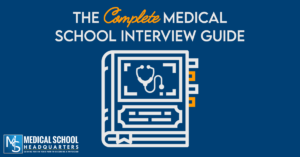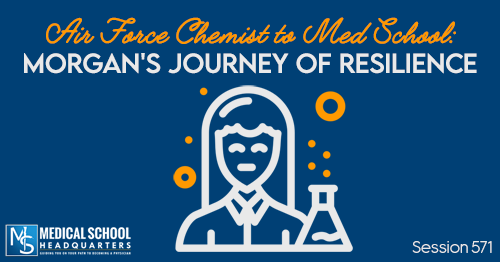If you’re reading this because you’re preparing for your medical school interview, celebrate yourself. You’re doing at least something right. You survived the prerequisites, the MCAT, and the written parts of your application. You’ve shown your academic capability and told your story in a way that at least one school wants to learn more about you. Give yourself the time to feel relief and pride in your accomplishments so far.

It’s easy to overthink the interview process, but the main point of a traditional interview is to show that you’re a normal person who can hold a reasonable conversation. They also want you to show that you can be a good classmate and community member. They don’t need or want you to prove that you’ll be a good physician. You need to be teachable, intelligent, and a decent person. If you have those things, they can teach you the rest. The most important things you can do are be on time, dress appropriately, be friendly and professional, and have genuine conversations.
Types of Interviews
There are a few different types of interviews, but for the most part, the way you prepare for them is the same.
Traditional one-on-one interviews
A traditional interview is a one-on-one conversation with a single person trained to interview prospective medical students. Your interviewer might be a faculty member, a current student, or a community volunteer. Traditional interviews might be open-file, closed-file (blind), or partially open.
Here are examples of common traditional interview questions:
- Tell me about yourself.
- Why do you want to be a doctor?
- What is your greatest strength?
- What is your biggest weakness?
- Why should we accept you?
- Why do you want to come to this school?
- Tell me about a time you failed and what you learned from it.
Open-File Interview
Open-file means that the interviewer has access to every aspect of your application. It’s the case for every interview, but especially an open-file interview, that you should be extremely familiar with your application, including the secondary application.
Review your materials before your interview so you can answer any questions about your application. Be prepared to answer any questions about your application, and particularly any red flag questions about things like poor grades, gaps in your education or activities, or institutional actions.
The biggest mistake students make with open-file interviews is avoiding what would otherwise be a great answer because it’s already in their application. Don’t give a weaker answer to avoid repeating yourself. If they want you to discuss something not already in your application, they’ll say that in the question.
Apple Podcasts | Google Podcasts
Closed-File Interview
In this case, the interviewer doesn’t have access to any part of your file. You should approach it the same way as an open-file interview. The key difference is that you won’t be asked about specific parts of your application.
If you know an interview is blind, don’t try to force in specific parts of your application. Your application will be included in the school’s evaluation of you even if the specific person interviewing you doesn’t have access to it. Answer the question asked instead of trying to force in what you want to talk about.
MMI
MMI stands for the multiple mini interview, and it is similar to a situational judgment test like Casper or PREview. In an MMI, you answer questions about a hypothetical scenario or act out a situation with another student, actor, or interviewer. Common prompts include things like ethical dilemmas or dealing with difficult people.
They’re not looking for you to be the perfect person. The goal is to evaluate how well you can explain your thought process and respond to a complex scenario in a short amount of time. Learn about and avoid the biggest mistakes students make in MMIs, and you’ll do fine.
MMI Format
Traditionally, an MMI includes seven to ten stations with a different scenario at each. You are usually given two minutes to read the scenario outside of the room before hearing an alarm signaling you to enter the room. There will be an actor, interviewer, or small group in the room, and they will work through the scenario with you. You will likely be given six to eight minutes, but you don’t have to talk the entire time. You want to provide space for the interviewer to ask follow-up questions or to listen to the actor if it’s a roleplay scenario.
In an actor-based scenario, make sure you listen to the actor. Listen to understand, and don’t spend the whole time thinking of your next response. There are no perfect responses to either a written scenario or an interaction with an actor. Respond with kindness and respect, and explain how you drew your conclusions, and you’ll do fine.
What Not to Do In An Interview
Relate Everything to Medicine
Similar to secondary essays, the point is to answer the specific question being asked and not to try to push any agenda you have. The impulse to relate all of your responses to medicine is understandable, but following through on it can hurt your interview performance. Answering non-medical questions in this way might come from a fear that the interviewer is trying to test how dedicated you are to medicine, but they’re not. Focus on honestly answering the specific question that’s asked of you, not what you think the interviewer wants you to say.
If they’re asking you about your hobbies, they want to know about them. The arguably main goal of the interview is to let them see you as a fully fleshed-out person instead of a series of numbers and words on a page. Being honest about who you are and allowing them in is the only way to do that. Otherwise, you’re just like every other candidate, and there’s no way for them to see if you specifically are a good fit for the school.
Remember that you’re just having a conversation, and you’ll be okay.
Preparing for the Interview
Even though you should practice responding to common questions, and I provide many examples, the goal of practicing isn’t to have an answer ready for every possible question. You want to have practiced a wide enough variety of questions that you feel comfortable answering any question. It will also help you practice thinking on your feet because there’s a decent chance that your interviewer will ask a question you didn’t expect. You want to get rid of the panic at unexpected questions, not have a script for every possible question.
There are two significant downsides to having a “scripted” response to interview questions. Your answers will come across as stilted, and if you forget your script, you might panic and find yourself unable to answer the question anyway.
Mock Interviews
Mock interviews are a great way to practice because they allow you to get comfortable answering questions on the spot in a lower-stakes environment without giving you enough time to script your responses. If your first mock interview goes poorly, don’t panic. Interviewing is a skill, and it’s one you can learn. Find someone like your campus’s premed advisor or one of our Mappd advisors who can give you good feedback and help you improve your interview skills and comfort level with the process.
You can book a mock interview or prep session with one of our Mappd Advisors!
Interview Timeline
Interview invitations might be sent out starting mid to late July and can keep coming until late March or April. DO schools may sometimes interview students even later than this. They may also interview students earlier since AACOMAS transmits applications sooner than AMCAS.
Once selected for an interview, you will usually be given a few dates to choose from. Being interviewed earlier means you will be reviewed earlier, while there are the most seats left. So, it may make sense to try to choose an early interview date from those offered to you. Ultimately, choose the date that makes the most sense for you.
What to Bring
You don’t need to bring much, if anything, to your interview. You don’t need copies of your resume or any other application materials. I do recommend you bring a folio to take notes in. Throughout the day, you’ll be given helpful information like when you can expect to hear back from the school. Write these down, so you don’t forget in the day’s excitement.
Don’t bring your phone. If you do bring it, make sure it’s off and put away. The last thing you want is to have your phone ring during the interview itself or while the director of admissions is addressing all of you.
What to Wear
A medical school interview is a professional event, and you should dress accordingly! This means a suit with a tie, a pantsuit, a skirt suit, or dress suit. Stick with classic colors like navy, black, brown, and charcoal. You don’t want what they remember most about you to be what you were wearing-or hair and accessories. If you’re unsure about something, this is something else that a trusted advisor can give you good feedback on.
At pre-interview events, the dress code may not be business formal like the interview, but you should still follow it. If the dress code says casual, aim for business casual.
Post-Interview
Thank You Notes
I recommend sending thank you notes to the interviewer themselves or the admissions committee. Try to find out ahead of time if the school prefers email or written letters. Try to send these as soon as possible after the interview. This is another good reason to bring a folio with you on the day. You can make a note of anything memorable about each encounter and include that in the thank you letter. It takes it beyond the generic and may help your interviewer remember you better.
If a school specifically tells you not to send thank you letters, don’t send one. You never want to violate a school’s preferences or policies.
Wait
The waiting game after an interview can be stressful, but hopefully the school gave you an idea of when you should get an update from them.
More Links and Resources
Learn how to ace your MMI in our upcoming workshop!







